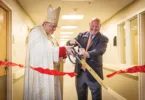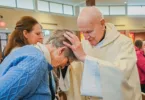Ancient tradition making a comeback
——————————————————————————————————————
by Joe Bollig
joe.bollig@theleaven.org
KANSAS CITY, Kan. — The church calendar had been accumulating memorials, feasts and solemnities for centuries.
But it wasn’t until 1264 that the universal church set aside a specific day to celebrate the mystery of the Eucharist.
That celebration is called the solemnity of the Body and Blood of Christ — or Corpus Christi — which falls this year on June 14. Corpus Christi means “Body of Christ” in Latin.
The upcoming solemnity had its start with St. Juliana of Mont Cornillon, in what is now Belgium. She had, since her youth, a great love for the Eucharist and reportedly had a vision that inspired her to seek a special feast in its honor.
Eventually, St. Juliana persuaded Bishop Robert de Thorete of Liege to establish Corpus Christi as a diocesan feast. After he died, his successor asked Pope Urban IV to extend the feast to the whole church, which he did.
“Sometimes feasts like Corpus Christi, Holy Trinity and Sacred Heart are called ‘idea feasts,’ because they don’t signify a historical moment in the life of Christ, Our Lady, or one of the saints, but focus on a particular mystery of the faith,” explained Michael Podrebarac, archdiocesan consultant for liturgy.
Pope Urban IV turned to St. Thomas Aquinas to compile the liturgical text for the feast. St. Thomas’ contribution is retained in the “great sequence” of Corpus Christi, he said. Today, it’s optional, and because of its demands, seldom used.
One of the distinctive aspects of Corpus Christi is a procession with the Eucharist displayed in a monstrance. Even today, huge Corpus Christi processions are popular in many countries across the world, but even in the days prior to the Second Vatican Council the processions were not as important a fixture in American society.
Following Vatican II, many eucharistic devotions, like Corpus Christi, declined in popularity because many people felt they had to shift their attention toward living the Eucharist in their daily lives.
“Of course, it was a false choice,” said Podrebarac. “We don’t have to choose between showing our devotion and love to the Eucharist and living the fruits of that Eucharist in our daily lives. They really go hand in hand.”
“I think what’s happening now is a certain rediscovery of the benefits of eucharistic devotion,” he continued. “We’ve seen it for probably the last 20 years in eucharistic practices in our parishes.”
Thanks to Archbishop Joseph F. Naumann and Bishop Robert Finn of the Diocese of Kansas City-St. Joseph, said Podrebarac, there has been a resurgence in the public celebration of the Eucharist through Corpus Christi processions in the Kansas City metro area.
Now, Catholics who have never had the opportunity before to witness to their eucharistic devotion publicly have the chance to do so. And because of the active nature of the procession itself, it makes for a worship opportunity perfect for even families with young children.
“I think it would be a great family activity,” said Archbishop Naumann. “I think most of us developed our devotion through the example of our family. I know my grandfather was a great witness to me about the importance of eucharistic adoration.”
“We’re especially encouraging families who have first communicants to have them wear their special dress or suit they wore,” he added, “and to celebrate their family member who has just begun the privilege of receiving the Eucharist.”
“We also encourage our young people who have been confirmed this past year to participate,” he said. “Part of confirmation is to give a public witness of your faith, and a procession like this through the streets is one of the ways we can do that.”
Some parishes in the archdiocese have longstanding traditions associated with Corpus Christi Sunday, and the archbishop encourages them to continue these.
“In different areas of the archdiocese there are already local traditions of Corpus Christi processions, and I’m not suggesting that those be changed or altered,” said Archbishop Naumann. “For those communities who do not, I think this celebration in the Kansas City area could be a pilgrimage for some of our parishioners who must travel some distance to come to St. Agnes Parish.”
This year’s archdiocesan-wide Corpus Christi celebration will be co-hosted
by the Archdiocese of Kansas City in Kansas and the Diocese of Kansas City-St. Joseph. Archbishop Naumann and Bishop Finn will preside.
The event opens with the exposition of the Blessed Sacrament from 1-2 p.m. at St. Agnes Church, 5250 Mission Rd., Roeland Park, during which time the sacrament of reconciliation will be offered.
The eucharistic procession will begin at 2 p.m., heading up Mission Road to West 50th Street, turning left and continuing to Reinhardt, and then turning left again to the Bishop Miege High School stadium, where the event will conclude with Benediction.
An ice cream social will follow.






